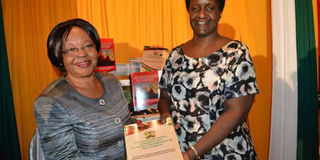Moi credited with enabling women acquire IDs

What you need to know:
- Law didn't allow women to have IDs before 1979
- Registration of Persons Act amended in 1980 to raise registration age from 16 to 18 years
- Effie Owour the first female High Court and appellate judge in the country
- Winfred Nyiva Mwendwa appointed minister of Culture and Social Services in 1995
- Dr Sally Kosgei appointed as the Head of Public Service in 2001
Before 1979, the law did not allow women in Kenya to have Identity Cards (IDs) a crucial government document used to identify an individual.
The trend originated from the colonial to post-independence period with human rights crusaders terming it discriminatory.
However, women in the country got a reprieve when in 1978, an amendment was made to the Registration of Persons Act (Cap 107, Laws of Kenya) to include the registration of women who had attained the age of 16 years and above.
A further amendment to the Act was made in 1980 to raise registration age from 16 to 18 years.
Under the Registration of Persons Act (Cap.107), Kenyan citizens who have attained the age of 18, are required to have an ID facilitated through the Department of National Registration Bureau.
The amendment of the law by the Moi government is to date, credited with enabling women to have the precious document.

A National Registration Bureau official helps elderly women register for the new generation ID at Kimachia in Tigania West, in 2015. PHOTO| FILE | NATION MEDIA GROUP
The former fallen president is also credited with appointing women in senior government positions, a thing that was not the case during his predecessor Jomo Kenyatta’s government.
In 1982, he appointed Effie Owour to the High Court, making her the first female High Court and appellate judge in the country.
Prior to her appointment, Ms Owour had in 1970, become Kenya’s first female magistrate.
Justice Owour, a former student of Alliance Girls High School also chaired the National Task Force of Children’s Laws (1992-1996) which came up with the Children’s Act of 2001.
In 1995, Moi appointed Winfred Nyiva Mwendwa as the minister in-charge of Culture and Social Services.
This appointment thrusted her into history books when she became the first woman to serve as Cabinet Minister in the country.
Immediately after her appointment, she led a delegation of about 450 women to the Beijing Conference in 1995.
Nyiva who retired from national politics in 2017, last week eulogised Moi as a man whose policies and actions empowered women.
BEIJING CONFERENCE
In an interview with a local daily, she pointed out that “her appointment may have been for the sole reason of leading the women to Beijing”.
The Beijing Conference, in its 25th anniversary, gave birth to Beijing Platform for Action, which outlines 12 key areas of focus, including promoting women rights to education, ending violence against women and involving them in peace building.
Before Nyiva’s appointment, the fallen former president had appointed several women assistant ministers, and others in senior positions in his government.
In 2001, Moi appointed Dr Sally Kosgei as the Head of Public Service, a position she held until 2003 when Francis Muthaura took over after Mwai Kibaki's win.
Dr Kosgei had the opportunity of overseeing and coordinating the historic hand over of the government from Moi to Kibaki in 2002.
Prior to joining State House, Sally was a career diplomat representing Kenya in Switzerland, Ireland as well as UN-Habitat.
Even after Moi's exit in 2002, she was retained in the Cabinet by Kibaki as the Minister for Higher Education before swapping with Agriculture Minister William Ruto after the 2007 General Election.
It was during Moi’s rule that the Maendeleo ya Wanawake Organisation thrived, although he was often accused of turning into a wing of the ruling party Kanu. The organisation has been credited with championing for women empowerment.
Ms Rahab Muiu, the current Maendeleo ya Wanawake chairperson who also served under the Moi described him as a ‘100 per cent accessible father’ who listened to women’s voices.
“He was a father figure and reachable, which made it possible for us to share women’s concerns, with him,” she said.
Other notable women who served in senior position in Moi’s government include Marerere Mwarpayo wa Mwachai who was the assistant minister for Gender, Culture and Social Sciences.
Mwachai also served as the Msambweni Constituency MP from 1997 to 2002.





